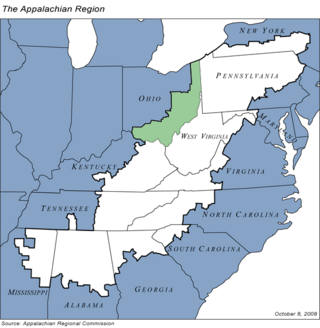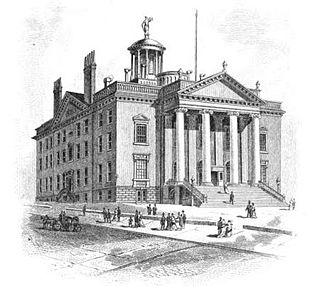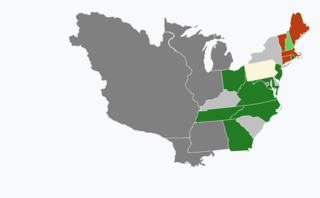
The 2nd United States Congress, consisting of the United States Senate and the United States House of Representatives, met at Congress Hall in Philadelphia, Pennsylvania, from March 4, 1791, to March 4, 1793, during the third and fourth years of George Washington's presidency. The apportionment of seats in the House of Representatives was based on the provisions of Article I, Section 2, Clause 3 of the United States Constitution. Additional House seats were assigned to the two new states of Vermont and Kentucky. Both chambers had a Pro-Administration majority.

The 2006 United States Senate election in Ohio was held November 7, 2006. Incumbent Republican Mike DeWine ran for re-election, but was defeated by Democratic congressman Sherrod Brown. As of 2024, this is the most recent time a Democratic Senate candidate in Ohio won a race by double digits.

This is a list of high school athletic conferences in Ohio, separated by Ohio High School Athletic Association (OHSAA) region. Some conferences have schools in multiple regions, and will be listed in all applicable regions. However, the conference information is on the region page where the most schools are classified in.
Ohio's 6th congressional district is a U.S. congressional district which is represented by Representative Michael Rulli of the Republican Party. Rulli was elected to the seat after he defeated Democrat Michael Kripchak in the June 11, 2024 special election, caused by the resignation of incumbent Bill Johnson (R) on January 21, 2024.

Appalachian Ohio is a bioregion and political unit in the southeastern part of the U.S. state of Ohio, characterized by the western foothills of the Appalachian Mountains and the Appalachian Plateau. The Appalachian Regional Commission defines the region as consisting of thirty-two counties. This region roughly overlaps with the Appalachian mixed-mesophytic forests, which begin in southeast Ohio and southwest Pennsylvania and continue south to Georgia and Alabama. The mixed-mesophytic forest is found only in Central and Southern Appalachia and eastern/central China. It is one of the most biodiverse temperate forests in the world.
The electoral history of each district in the Ohio House of Representatives can be traced from 1966 to the present.

The 70th New York State Legislature, consisting of the New York State Senate and the New York State Assembly, met from January 5 to December 15, 1847, during the first year of John Young's governorship, in Albany.

The 81st New York State Legislature, consisting of the New York State Senate and the New York State Assembly, met from January 5 to April 19, 1858, during the second year of John A. King's governorship, in Albany.

The 90th New York State Legislature, consisting of the New York State Senate and the New York State Assembly, met from January 1 to April 20, 1867, during the third year of Reuben E. Fenton's governorship, in Albany.

Samuel Sullivan was the fourth Ohio State Treasurer from 1820 to 1823. He was the first manufacturer of fine pottery in Zanesville, Ohio.

The 141st New York State Legislature, consisting of the New York State Senate and the New York State Assembly, met from January 2 to April 13, 1918, during the fourth year of Charles S. Whitman's governorship, in Albany.

The First Ohio General Assembly was the initial meeting of the Ohio state legislature, composed of the Ohio State Senate and the Ohio House of Representatives. It convened in Chillicothe, Ohio, on March 1, 1803, and adjourned April 16, 1803. This General Assembly coincided with the first year of Edward Tiffin's first term as Ohio Governor.

The Second Ohio General Assembly was the second meeting of the Ohio state legislature, composed of the Ohio State Senate and the Ohio House of Representatives. It convened in Chillicothe, Ohio, on December 5, 1803, and adjourned February 17, 1804. This General Assembly coincided with the second year of Edward Tiffin's first term as Ohio Governor.
Since the OHSAA began basketball competition in 1922–23, many schools have decided to band together in conferences to help scheduling, added competition for titles and bragging rights, and oftentimes help determine seeding for the early rounds of the state tournament. Some conferences had been established for football-playing schools, and as schools added other sports, adopted those under the conference banner once enough schools started playing. Smaller schools often picked up basketball first, adding other sports later, and combined with other in-county schools to form County conferences. Most of these leagues were formed in the 1920s and early 1930s after the tournament was started, which is why quite a few lack a definitive starting date at this point in time.

The 1968 United States presidential election in Ohio took place on November 5, 1968. All 50 states and The District of Columbia were part of the 1968 United States presidential election. Ohio voters chose 26 electors to the Electoral College, who voted for president and vice president.

The 1964 United States presidential election in Ohio was held on November 3, 1964, as part of the 1964 United States presidential election. Voters chose 26 representatives, or electors, to the Electoral College, who voted for President and Vice President.

United States gubernatorial elections were held in 1805, in 13 states.

The Third Ohio General Assembly was the third meeting of the Ohio state legislature, composed of the Ohio State Senate and the Ohio House of Representatives. It convened in Chillicothe, Ohio, on December 3, 1804, and adjourned February 22, 1805. This General Assembly coincided with the last year of Edward Tiffin's first term as Ohio Governor.

The Fourth Ohio General Assembly was the fourth meeting of the Ohio state legislature, composed of the Ohio State Senate and the Ohio House of Representatives. It convened in Chillicothe, Ohio, on December 2, 1805, and adjourned January 27, 1806. This General Assembly coincided with the first year of Edward Tiffin's second and final term as Ohio Governor.

The Fifth Ohio General Assembly was the fifth meeting of the Ohio state legislature, composed of the Ohio State Senate and the Ohio House of Representatives. It convened in Chillicothe, Ohio, on December 1, 1806, and adjourned February 4, 1807. This General Assembly coincided with the second year of Edward Tiffin's final term as Ohio Governor.











